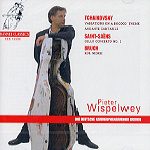Cellist Pieter Wispelwey plugs a few gaps in his existing Channel Classics discography with these engaging, imaginative performances. He’s accompanied by the Deutsche Kammerphilharmonie Bremen in works by Saint-Saëns, Tchaikovsky, and Max Bruch. First up is the concerto by Saint-Saëns in an intimately detailed performance that merits high commendation. Wispelwey plays with unwavering finesse, and his deftly agile reading is memorable for some movingly under-stated playing in the plaintive minuet. Even though the voltage is lower in the outer sections of the work than in Yo-Yo Ma’s vehemently urgent CBS-Sony recording with the French National Orchestra and Lorin Maazel, Wispelwey’s is the better choice. With its appealing lightness of touch, elegance, and pungency (exactly where needed), it’s a more relaxed, genial, and well-mannered view.
The Tchaikovsky “Rococo” variations is an exacting work, and with seeming effortlessness Wispelwey shows that his technical capabilities leave nothing to be desired. But his interpretation doesn’t quite have the charisma that Rostropovich affords on his DG “Originals” coupling with the Dvoràk concerto, accompanied by Karajan and the Berlin Philharmonic. Steven Isserlis, with John Eliot Gardiner and the Chamber Orchestra of Europe (Virgin) give a performance that’s comparable in scale to Wispelwey’s. With finer, firmer, more lustrous tone colours from Isserlis, this Virgin performance also is wonderfully and subtly alive to the changing moods of the successive variations. Lastly, Wispelwey gives neat and polished accounts of the slighter Bruch and Tchaikovsky pieces, and the new Channel Classics production also sounds very fine indeed, despite minor reservations about the “Rococo” variations, in which Rostropovich and Isserlis are both more compelling.
































